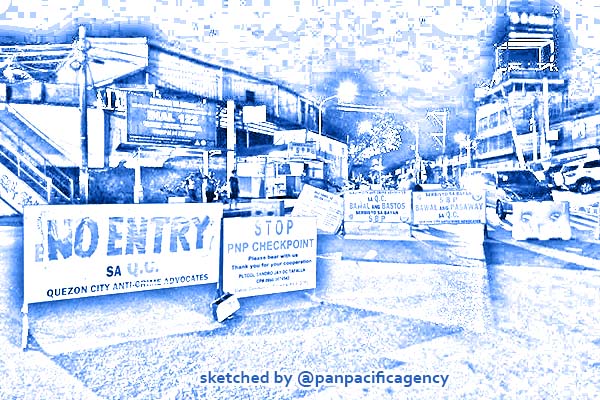No gatherings, but public transportation will be allowed in Philippine areas under quarantine from May 1

Checkpoint in the Philippines. Photo: PhilStar. Sketched by the Pan Pacific Agency.
MANILA, May 1, 2020, PhilStar. Religious gatherings and work gatherings in areas under general community quarantine will not be allowed, IATF spokesperson Harry Roque says, The Philippine Star reported.
According to Roque, the IATF has revised its guidelines on mass gatherings, which will be the same with areas under enhanced community quarantine.
“Alinsunod po sa mga reklamo na natanggap na nanggagaling po sa mga local official na imposible raw pong ma-implement ‘yung social distancing sa religious meetings saka sa mga work gathering, nabago na po ang guidelines. Bumalik po tayo sa rules under ECQ,” Roque says at the Laging Handa virtual briefing.
Interior Local Government Setecretary Eduardo Año says public and mass transportation will be allowed in areas under general community quarantine, provided that one-meter distancing and other preventive measures to prevent the spread of COVID-19 are observed.
He adds that jeepneys are still not allowed to operate.
Other regions and provinces in the Philippines considered moderate and low-risk areas will be placed under general community quarantine starting May 1.
Who can go to work in GCQ areas?
Government workers
Work in government offices may be at full operational capacity or under alternative work arrangements in accordance with Civil Service Commission rules
Category I industries that are allowed to work at full operational capacity (work from home or other arrangements also allowed)
“Agriculture, fishery, and forestry industries, food manufacturing and food supply chain businesses, including food retail establishments such as supermarkets, grocery stores, and food preparation establishments insofar as take-out and delivery services, food delivery services, health-related establishments, the logistics sector, information technology and telecommunication companies, media”
Category II industries allowed to work “between 50% capacity up to full operational capacity” (work from home or other arrangements also allowed)
“Mining and other manufacturing, export-oriented, and electronic commerce companies, as well as other delivery, repair and maintenance, and housing and office services”
Category III industries allowed to operate at a maximum of 50% working on site (work from home or other arrangements also allowed)
“Financial services, BPOs, legal and accounting, and auditing services, professional, scientific, technical, and other non-leisure services, and other non-leisure wholesale and retail establishments”
Other industries
“Limited operations in malls and shopping centers shall be allowed, except for leisure establishments and services which shall continue to be closed”;
Essential public and private construction projects are allowed;
Amusement, gaming, and fitness establishments and businesses in the kids and tourism industry are not allowed to operate;
Except for Philippine Offshore Gaming Operators, which are for gambling but that presidential spokesperson Harry Roque says are like BPOs, if you think about it.
Hotels are allowed to accommodate guests with existing booking accommodations for:
- foreigners
- guests with existing long-term bookings
- distressed OFWs and stranded Filipinos or foreign nationals
- people undergoing mandatory quarantine
- healthcare workers and employees of exempted establishments